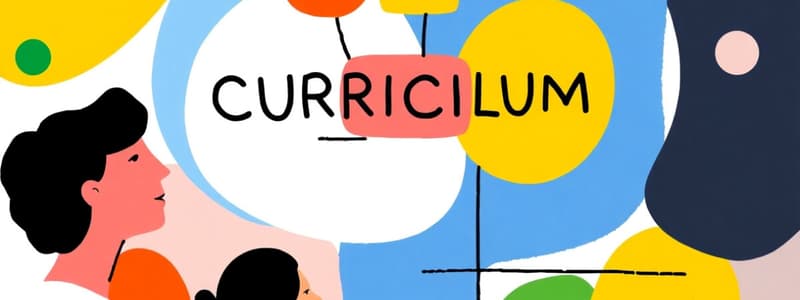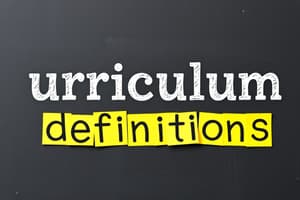Podcast
Questions and Answers
What is the Arabic phrase at the beginning of the document?
What is the Arabic phrase at the beginning of the document?
Bismillah al-Rahman al-Rahim
What is the title of Chapter one?
What is the title of Chapter one?
Key Terms and Concepts
Who is the author of this chapter?
Who is the author of this chapter?
Dr. Asmaa Zedan El Sayed
What is a curriculum?
What is a curriculum?
The traditional view of curriculum is limited to academic subjects or content/syllabus.
The traditional view of curriculum is limited to academic subjects or content/syllabus.
What is the focus of the more recent conceptualization of curriculum?
What is the focus of the more recent conceptualization of curriculum?
What is the name of the organization that recommends curriculum standards in Egypt?
What is the name of the organization that recommends curriculum standards in Egypt?
What is the term for curriculum that is based on the recommendations and includes syllabus, modules, books, and instructional guides?
What is the term for curriculum that is based on the recommendations and includes syllabus, modules, books, and instructional guides?
What is the term for curriculum that is put into action in the classroom by the teacher?
What is the term for curriculum that is put into action in the classroom by the teacher?
What is the term for curriculum that includes support materials, facilities, and resources used in the learning process?
What is the term for curriculum that includes support materials, facilities, and resources used in the learning process?
What is the term for curriculum that includes assessments and evaluations to track student progress?
What is the term for curriculum that includes assessments and evaluations to track student progress?
What is the term for curriculum that refers to the learning outcomes achieved by the students?
What is the term for curriculum that refers to the learning outcomes achieved by the students?
What is the term for curriculum that includes unwritten social, cultural, and behavioral norms learned in school?
What is the term for curriculum that includes unwritten social, cultural, and behavioral norms learned in school?
Flashcards
Traditional Curriculum Definition
Traditional Curriculum Definition
A written document or plan of action for achieving goals; a collection of subjects or content prepared by teachers for student learning.
Progressive Curriculum Definition
Progressive Curriculum Definition
A plan of action focused on achieving educational goals and objectives; it includes learning activities designed to help students reach these goals.
Curriculum Includes
Curriculum Includes
The subjects and activities that a school system is responsible for.
Curriculum Includes
Curriculum Includes
Signup and view all the flashcards
Broad Curriculum Definition
Broad Curriculum Definition
Signup and view all the flashcards
Traditional Curriculum as Subjects
Traditional Curriculum as Subjects
Signup and view all the flashcards
Syllabus
Syllabus
Signup and view all the flashcards
Curriculum as Performance Objectives
Curriculum as Performance Objectives
Signup and view all the flashcards
Curriculum Focus
Curriculum Focus
Signup and view all the flashcards
Comprehensive Curriculum
Comprehensive Curriculum
Signup and view all the flashcards
Capacities
Capacities
Signup and view all the flashcards
Inclusive Curriculum Definition
Inclusive Curriculum Definition
Signup and view all the flashcards
Ideal Curriculum
Ideal Curriculum
Signup and view all the flashcards
Curriculum Standards
Curriculum Standards
Signup and view all the flashcards
Written Curriculum
Written Curriculum
Signup and view all the flashcards
Taught Curriculum
Taught Curriculum
Signup and view all the flashcards
Supported Curriculum
Supported Curriculum
Signup and view all the flashcards
Assessed Curriculum
Assessed Curriculum
Signup and view all the flashcards
Learned Curriculum
Learned Curriculum
Signup and view all the flashcards
Hidden Curriculum
Hidden Curriculum
Signup and view all the flashcards
Hidden Curriculum Examples
Hidden Curriculum Examples
Signup and view all the flashcards
Hidden Curriculum Nature
Hidden Curriculum Nature
Signup and view all the flashcards
Study Notes
Introduction to Curriculum
- The presentation begins with an Islamic salutation, "بسم الله الرحمن الرحيم" (Bismillah al-Rahman al-Raheem), meaning "In the name of God, the Most Gracious, the Most Merciful."
- The presentation's title is "Chapter One: Key Terms and Concepts" by Dr. Asmaa Zedan El Sayed.
- A question is posed: "Can you think of a good definition for "curriculum?"
- A YouTube video link (https://www.youtube.com/watch?v=N QmuywW-qTc) is provided for further information about the curriculum.
- The audience is asked to consider if the video provides a comprehensive idea of the curriculum.
Traditional Perspective of Curriculum
- In the early 20th century, the traditional view considered the curriculum as a formal document.
- This document served as a plan or course of action for achieving instructional goals.
- A body of subjects or subject matter was designed by teachers for student learning.
- Curriculum was essentially synonymous with "course of study" or "syllabus."
Progressive Perspective of Curriculum
- Curriculum is seen as a plan for achieving goals and objectives.
- It's a set of learning activities.
- Its aim is for students to attain goals set by the educational system.
Components of Curriculum
- Curriculum encompasses the subjects and activities that the school system is responsible for.
- It defines the learning environment.
- It specifies activities and processes within formal educational institutions.
- No educational institution can exist without a curriculum.
- A broader perspective sees curriculum as all student learning experiences, not just the syllabus.
Development of the Concept of Curriculum
-
Traditional view focused on a list of subjects taught.
-
The curriculum was defined as what was taught in schools, primarily focusing on academic subjects.
-
A syllabus was viewed as a summary statement outlining course or subject content.
-
A more recent view of curriculum considers performance objectives and specific competencies that learners must attain.
-
These competencies should be comprehensive and cover the lifespan of each student.
-
Attributes such as communication skills, civic participation, and well-being are considered important parts of an improved curriculum.
Inclusive Curriculum
- Curriculum is defined as selected, organized, integrative, innovative, and evaluative educational experiences.
- These experiences are provided purposefully to students, either explicitly or implicitly, to achieve learning outcomes.
- These goals are designed to enable students' growth, development, and preparation for a modern and evolving society.
Types of Curriculum (Allan Glatthorn 2000)
- Various types of curriculum are detailed, including:
- Recommended curriculum
- Written curriculum (syllabus, modules, etc.)
- Taught curriculum (classroom activities)
- Supported curriculum (materials and learning tools)
- Assessed curriculum (tests, evaluations)
- Learned curriculum (student outcomes and behaviors)
- Hidden curriculum (unstated learning, values)
Ideal or Recommended Curriculum
- Policy makers and educators develop and recommend curriculum frameworks.
- Examples such as NAQAA (Egypt) or the Common Core (USA) are mentioned.
- Curricula are influenced by research findings and educational innovations.
Intentional or Formal Curriculum
- Includes documents like course outlines, syllabi, books and instructional guides
- Developed by curriculum specialists and teachers
Taught Curriculum
- Specifies the direct activities implemented in the classroom
- Activities aim to fulfill the objectives of the formal curriculum
- Designed by teachers to meet student learning styles
Supported Curriculum
- Includes materials supporting teaching and learning
- Examples included print and digital materials, learning environments (like labs, libraries, playgrounds)
- Provides resources to make learning more meaningful
Assessed Curriculum
- Involves a variety of assessment tools (tests, portfolios)
- Used by teachers to evaluate student progress
- Aims to measure if learning objectives are being met
Learned Curriculum
- Refers to the actual knowledge, skills and behaviors students gain.
- Measured through assessment tools, changes in students' behaviors
Hidden Curriculum
- Includes lessons, values, perspectives students absorb unknowingly in school
- Includes unstated lessons and values on social interaction, cultural awareness
- Observational learning and implicit messages impact student development
Hidden Curriculum Video
- A YouTube video about hidden curriculum (https://www.youtube.com/watch?v=jcrTblHg8_U) on art students guides exploration of this area.
- The presentation encourages critical reflection on the hidden curriculum's influence on English students.
Studying That Suits You
Use AI to generate personalized quizzes and flashcards to suit your learning preferences.




